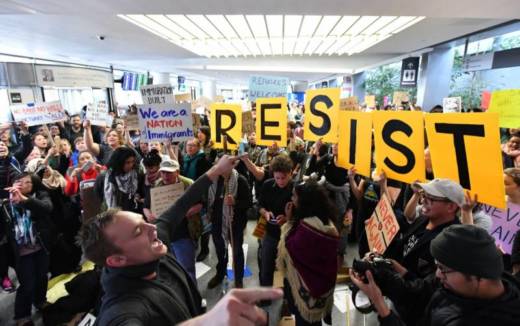For Saravi, the whole process has been nightmarish. But travel restrictions aren’t just a problem for individual researchers like him, or for the labs where they were slated to work. They threaten cross-border collaborations that tap talent and ideas from elsewhere and hasten discoveries, scientists said.
Many of those kinds of collaborations begin with an encounter at a scientific conference, or, as this one would have, with a student or postdoc coming to train in the United States, and then going elsewhere to start another lab. By working with a different team — or multiple teams around the world — scientists may entertain hypotheses they might not have considered, and can enlist patients from other countries who would not have been able to participate in their study.
The ban affects more researchers from Iran and Iraq than from the other five countries, in part because more Iranians and Iraqis come to the United States every year on the types of visas given to scientists. In the 2015 fiscal year, there were 847 Iraqis and 820 Iranians here on a J1 visa, which is given to postdocs and medical residents, while there were only 122 from Syria, and even fewer from the other countries.
“About 50 percent of our members are located outside of the US; the reason for this is that science is global,” said Stefano Bertuzzi, executive director of the American Society for Microbiology, who was adamant that his organization is nonpartisan and willing to work with the new administration. But to him, the travel ban sends a message that is dangerous for science.
“You can’t find all your expertise in one country, even in a country that is the size of a continent, like the United States,” he said. “Our work is on preventing, curing, and diagnosing infectious diseases. If we don’t work together on that, the whole society will collapse, or at least take a big hit.”
His inbox has exploded with emails from organizers and attendees of the ASM Microbe meeting in New Orleans this coming June who are worried about the ban.
“I’ve been inundated,” Bertuzzi said. Even those who would be able to get into the country are telling him they won’t come to the United States until Trump’s order is no longer in effect.
“I can tell you I have received emails saying, ‘We have already collected abstracts from people from these countries’ … ‘I don’t want to organize a meeting in the US,’ ‘I want to withdraw my abstract.'”
Dr. Mehdi Farokhnia is a postdoc who studies alcohol addiction at the National Institutes of Health. His work depends on being able to meet and exchange ideas with scientists at conferences. Last year, that took him to Scotland, Japan, and Canada. And even though he has American citizenship, he’s also a citizen of Iran, and now he won’t leave the United States for fear of not being let back in.
“I’m a dual citizen, so I am somehow lucky in this situation, but it’s very, very stressful,” he said. “I don’t feel confident now to leave the country because I’m a dual citizen and nothing is clear.”
Many worry about the ban affecting the quality of clinical studies, by making it harder to include patients with different genetic backgrounds, experiences, and environmental exposures.
“By decreasing diversity in science, the bias in science will increase,” said Dr. Elmira Hassanzadeh, an Iranian radiology resident at the University of Illinois at Chicago who spent the last two years as a researcher at Harvard. “If I’m an Iranian … I will collaborate with my Iranian peers. If there is a hospital that is doing the same kind of project, I can just pool our population and we can run a multi-center study. These are considered a very strong sort of data. If I’m not welcome here, my resources back home will also not be welcome here, and that will affect collaboration.”
One public health professor at a major American university, who didn’t want to be identified for fear of being targeted by the government for speaking out against the ban, is worried about collaborations like her own. While she was a postdoc at Harvard, she met some graduate students from one of the countries covered by the travel ban. After they took faculty positions in their home country, the team kept up discussions about public health, and in the last decade or so, that friendship has allowed them to coauthor eight to 10 scientific papers.
She worries not only that the executive order could interrupt her own fruitful collaboration — “It hinders our ability to interact and communicate in person,” she said — but also that it will stop other potential teams from meeting each other in the first place.
Saravi is devastated. Doing research at Harvard was a “childhood dream,” he said, and he spent 16 months trying to secure his visa.
But Michel sees this as a loss for Americans as much as it is for Saravi: “This is really the lifeblood of Boston biomedicine, foreign nationals who represent the best and brightest of their nation.”
Kate Sheridan contributed reporting.

